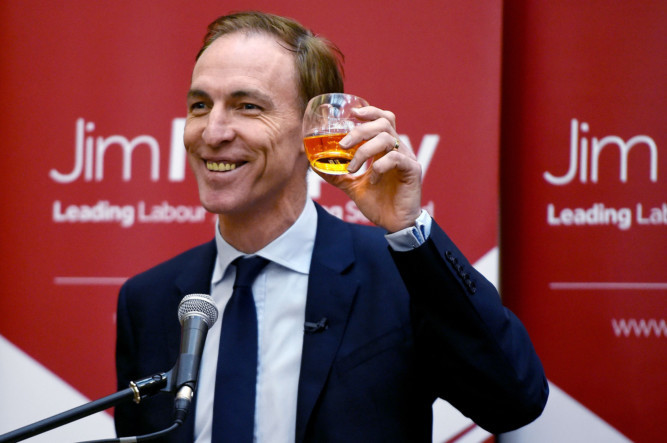
Since the General Election, Scottish Labour leader Jim Murphy has been stuck between a rock and a hard place.
The “hard place” was his party’s disastrous showing in Scotland, where it lost all but one of its MPs and the “rock” was his continuing leadership having been defeated in his own constituency of East Renfrewshire.
Yesterday that rock, as Alex Salmond might have put it, melted in the sun.
Despite obvious determination to lead his decimated party into next year’s Holyrood elections, the pressure not to, from certain colleagues and trade unions, was simply too great.
Although he won support from Scottish Labour’s National Executive Committee, at 17 votes to 14 it was not exactly overwhelming. Liberated, meanwhile, from the burdens of leadership, Murphy hit out at what he called the “destructive behaviour of one high-profile trade unionist”.
But it wasn’t Len McCluskey’s fault that Murphy had to resign as leader (although his constant sniping won’t have helped). In reality Murphy had an impossible task in the period between last year’s referendum and the recent election.
The referendum result revealed that thousands of Labour voters were falling out of love with a party they’d supported for decades and moving towards the SNP.
So in that context, no matter what Murphy said or did in order to lure them back, it largely fell on deaf ears.
No one could deny Murphy’s political energy I witnessed some of his Irn-Bru crate tour during the referendum but he shifted strategy too often, initially trying to out-nationalist the SNP, then pitching to the Left, and also trying to outbid the Nationalists when it came to the vision thing.
In any other context that might have worked, but Scottish politics since the referendum no longer plays by the rules, so politicians from all the Unionist parties and particularly Labour, have to adapt or die.
At the moment, Scotland’s “story” is controlled by the SNP Labour need to wrest it back.
That won’t be easy far from it but Murphy deserves praise for departing in a constructive way.
He says he intends to use his final month as leader to prepare the ground for his successor by compiling a report of proposed reforms.
Murphy said it would be for Scottish Labour to decide whether or not to accept them but, he warned, “a party in such urgent need of reform blocks those changes at its peril”.
It’s not yet clear what he means, although a completely autonomous Scottish Labour Party has been much discussed and might form part of the Murphy Plan.
While it’s difficult to believe voters worry about the finer points of party organisation, the perception that London calls the shots in Glasgow has clearly been unhelpful.
Much more challenging will be re-engaging with the voters who deserted Labour in droves a week and a half ago.
All the evidence suggests their disillusion with the party runs deep, so regaining their trust won’t simply be a matter of being more left-wing, promising to ditch Trident or supporting independence (as some analysis continues to propose).
So rebuilding the Scottish Labour Party is a long-term task and all it can hope to achieve at Holyrood next year is holding steady at 37 MSPs, perhaps by focusing more on the regional list vote than constituencies, most of which (based on current polling) the SNP will win easily.
A psychological change is also urgently required. Scottish Labour still gives the appearance of not having quite accepted the SNP’s narrow election victory more than eight years ago. Deal with that and the path ahead might look a lot clearer.
Report by politicial commentator David Torrance.

Enjoy the convenience of having The Sunday Post delivered as a digital ePaper straight to your smartphone, tablet or computer.
Subscribe for only £5.49 a month and enjoy all the benefits of the printed paper as a digital replica.
Subscribe